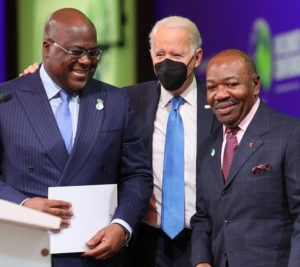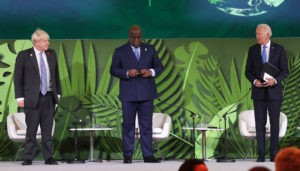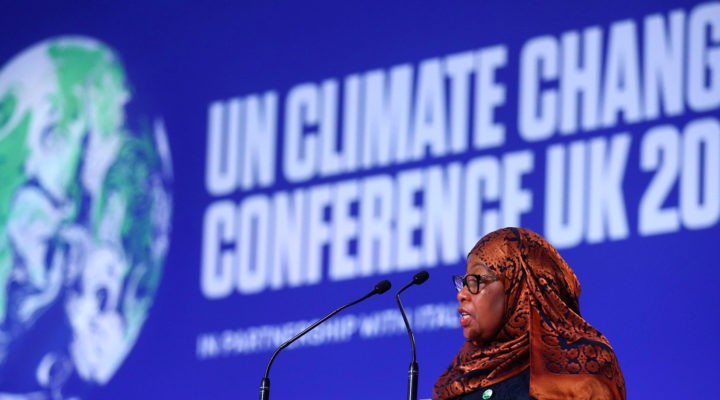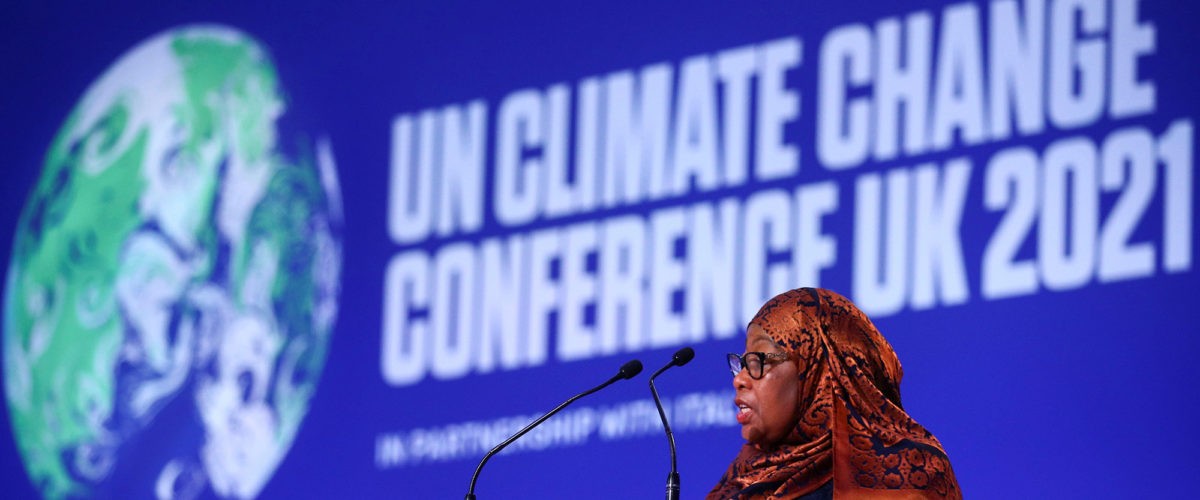Africa is the least aggravator for climate change yet has borne the most consequences for it, leaders from the continent declared at COP 26, the United Nations conference on climate change currently underway in Glasgow, Scotland.
According to the Center for Global Development, “the historical concentration of industry and wealth in developed countries mean they are responsible for 79% of the (carbon) emissions from 1850 to 2011.” Such emissions are major drivers of global warming.
Yet among the rest of the world’s countries — especially across Africa — the effects of climate change are more immediate and more potentially devastating.
“Africa is exceptionally vulnerable to climate variability and change compared with many other regions. Almost half of the population in sub-Saharan Africa live below the poverty line and depend on weather-sensitive activities, such as rain-fed agriculture, herding and fishing, for their livelihoods,” according to a new report released ahead of COP 26.
“Africa is exceptionally vulnerable to climate variability and change compared with many other regions.”
Titled “State of the Climate in Africa 2020,” the report, states that the effects of global warming already “have increased the frequency and intensity of droughts in some regions, lowered animal growth rates and productivity in pastoral systems and produced negative effects in food security in drylands, among other impacts.”
These climate changes also lead to human conflict, the report says. “Instances of conflict between farmers and pastoralists were recorded in several countries, arising from the stressors that natural hazards had placed on these vulnerable communities and the adverse impacts.”
It further emphasizes that “adaptation to climate change is the primary concern of African countries.”
At this year’s conference, African countries are seeking $3 trillion in funding to help mitigate the effects of climate change caused largely by countries outside of Africa.
The fight against climate change “can’t be won unless it is won in Africa,” said Felix Tshisekedi, president of the Democratic Republic of the Congo and chairman of the African Union, in his conference address.
In another speech at the event, Nigerian President Muhammadu Buhari spoke about the ravaging effects of climate change in his country and called for support to help mitigate the threat of global warming.
He listed desertification in the northern part of Nigeria, flooding, pollution and erosion across the country as ongoing challenges the West African nation grapples with due to climate change. He also reported that his country is committed to transitioning to cleaner and renewable energy sources in keeping with the objectives of the Paris Accord.

President of Congo Felix Tshisekedi, U.S. President Joe Biden and Gabon President Ali Bongo Ondimba onstage during an Action on Forests and Land Use event on day three of COP26 on Nov. 2, 2021, in Glasgow, Scotland. (Photo by Chris Jackson/Getty Images)
‘‘Parties to the Paris agreement are expected to transit from fossil fuel to clean energy and reach a net-zero ambition for greenhouse gases emission,’’ Buhari reminded the world leaders.
Although Nigeria is an oil rich nation, its priorities have changed due to the Paris Accord, he explained. ‘‘Nigeria is actually more of a gas- than an oil-producing country. … Nigeria has energy challenges for which, we believe, gas can be used to balance a renewable energy-based system, be it wind or sun. This would enable us to launch the long-term renewable energy infrastructure procurements and investments needed to have a sustainable energy supply.”
Samia Suluhu Hassan, president of Tanzania, said the East African country also is feeling the effects of global warming. The challenges, she said, include rising temperatures and sea levels, floods and drought. These problems are negatively affecting tourism and nature.
For example, the ecology of historic Mount Kilimanjaro is reeling from climate change and the “exotic and beautiful archipelago Zanzibar” is struggling. “We are experiencing all these despite our resolve to dedicate 48 million hectares to forest conservation,” she said.
“What does all these mean for a poor country like Tanzania? It means 30% of our GDP that comes from agriculture, forestry and fisheries is not sustainable.”
Not only is the problem urgent, but the steps other countries have pledged to take are not enough, Hassan said. “Sadly, the big resolve and robust steps to combat causes and effects of climate change are still low paced,” and “the Paris goal of achieving 1.5 degrees Celsius is yet to be met while more commitments are required.”
Hassan said her government, as part of its goals to address climate change, has managed to increase its power generation and reforestation rate by every year planting an average of 276 million trees. She then challenged the developed world to lend a helping hand. “If we developing countries have shown such leadership, why are (richer, developed) countries lagging behind?” she asked.
Leaders of two of the largest-carbon-emitting countries contributing to climate change expressed resolve to do more and to ask for more.

British Prime Minister Boris Johnson, President of Congo Felix Tshisekedi and U.S. President Joe Biden share the stage during an Action on Forests and Land Use event on day three of COP26 on Nov. 2, 2021, in Glasgow, Scotland. (Photo by Chris Jackson/Getty Images)
United States President Joe Biden and UK Prime Minister Boris Johnson made the case for greater commitment and synergy among nations. Reversing course from his predecessor, who worked against climate change agreeements, including pulling the U.S. from the Paris Accord, Biden pledged that the U.S. would lead by example under his watch and show the way in tackling climate change.
The U.S., like other countries, already suffers the effects of climate change and has a framework to combat it, yet he promised to assist other nations, particularly developing countries achieve their climate goals.
“We are gonna try to do our part when it comes to helping the rest of the world take action as well,” he said. “We want to do more to help countries around the world, especially developing countries accelerate their clean energy transition, address pollution. We all must share a clean planet. We have an obligation to help.”
Since September, “I announced that my administration is working with Congress to quadruple our climate finance support for developing countries by 2024, including significant increase and support for adaptation efforts.”
The global goal, he said, is to mobilize $100 billion annually to address climate change challenges. To meet the target, Biden challenged governments and the private sector worldwide to work together.
For many African leaders and climate activists, Biden’s pledge and the rallying voices of other speakers in Glasgow urging for more action from world leaders and people across the world, are crucial if the menaces of climate change are to be mitigated, not just in the continent, but across the world.
Anthony Akaeze is a Nigerian-born freelance journalist who currently lives in Houston. He covers Africa for BNG.
Related articles:
Christians and climate change: A chance to take the Bible seriously | Analysis by Chris Conley
Experts call for African and American synergy in tackling climate change


